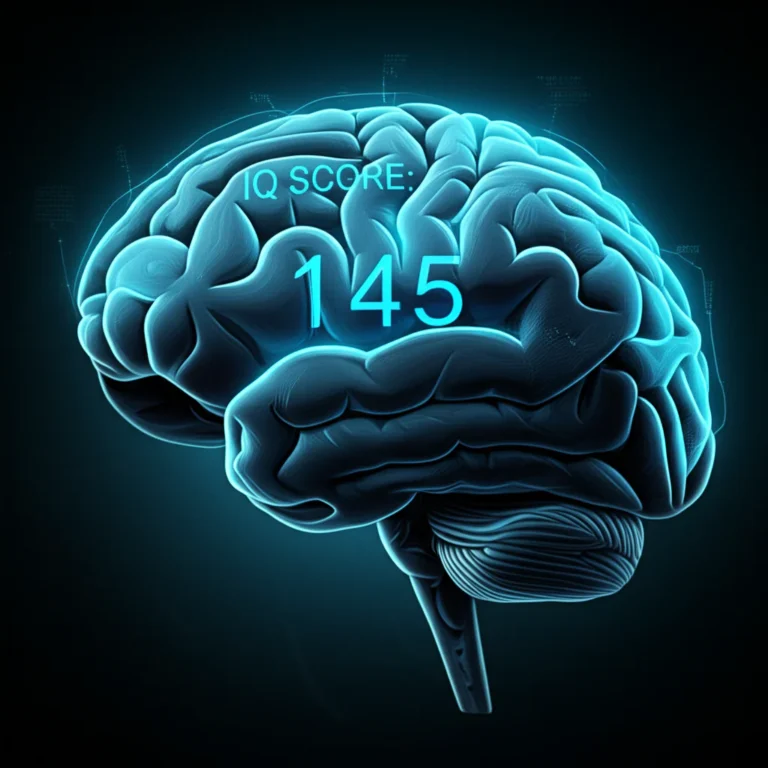Support our educational content for free when you buy through links on our site. Learn more
What Is the Normal IQ Range? Discover the Surprising Truth! 🧠
Have you ever wondered what the “normal” IQ range really means? Is it just a number, or does it tell a deeper story about how our minds work? Whether you’re curious about where you fit on the intelligence spectrum or intrigued by how IQ scores shape education and career paths, you’re in the right place.
In this article, we’ll unravel the history behind IQ testing, decode the mysterious bell curve, and break down the full spectrum of IQ classifications—from profound intellectual disabilities to genius-level brilliance. Plus, we’ll explore why IQ is just one piece of the puzzle and share expert tips on boosting your brainpower. Stick around for a fascinating look at how IQ scores vary globally and what they really mean for you.
Spoiler alert: Did you know that about 68% of people score between 85 and 115—the “normal” range? But there’s so much more beneath the surface. Ready to dive in?
Key Takeaways
- The normal IQ range is between 85 and 115, encompassing about 68% of the population.
- IQ tests measure specific cognitive abilities but don’t capture creativity, emotional intelligence, or practical skills.
- Modern IQ tests like the WAIS and Stanford-Binet use a bell curve to compare scores fairly across age groups.
- IQ scores can be influenced by genetics, environment, and lifestyle—your brain is more adaptable than you think!
- High IQ scores (130+) qualify for gifted programs and societies like Mensa, but intelligence is multifaceted.
- Boost your cognitive abilities with lifelong learning, healthy habits, and brain-training exercises.
Ready to explore the science and stories behind IQ? Let’s get started!
👉 Shop brain-boosting tools and books:
Table of Contents
- ⚡️ Quick Tips and Facts
- 🕰️ Unraveling the History of Intelligence Measurement: From Binet to Bell Curves
- 🧠 Demystifying the IQ Score: What Does ‘Intelligence Quotient’ Really Mean?
- 🎯 Unpacking the ‘Normal’ IQ Range: Where Do Most People Land?
- 📊 Beyond Average: A Comprehensive Look at IQ Classifications
- Profound Intellectual Disability (IQ 0-20)
- Severe Intellectual Disability (IQ 20-35)
- Moderate Intellectual Disability (IQ 35-50)
- Mild Intellectual Disability (IQ 50-70)
- Borderline Intellectual Functioning (IQ 70-79)
- Average Intelligence (IQ 80-119)
- High Average Intelligence (IQ 110-119)
- Superior Intelligence (IQ 120-129)
- Very Superior Intelligence (Gifted) (IQ 130-144)
- Profoundly Gifted / Genius (IQ 145+)
- What About “Above Genius”? Exploring the Upper Echelons of Cognitive Ability
- 🧪 The Science Behind the Score: How IQ Tests Measure Cognitive Ability
- 🧬 Nature vs. Nurture: What Really Shapes Your IQ Score?
- 🌍 IQ Across Borders: What’s the Average IQ Globally and in the U.S.?
- 🚧 Beyond the Numbers: The Limitations and Controversies of IQ Testing
- 🌟 A Broader View of Brilliance: Exploring Multiple Intelligences (EQ, Practical, Creative)
- 💪 Boosting Your Brainpower: Practical Tips for Cognitive Enhancement
- 💡 Understanding Your Cognitive Profile: Practical Applications of IQ Scores
- ✨ Conclusion: Embracing Your Unique Cognitive Spark
- 🔗 Recommended Links
- ❓ FAQ: Your Burning Questions Answered
- 📚 Reference Links
Here at Free IQ Tests™, we’ve spent years demystifying the world of intelligence, helping people like you not just find their IQ but understand what it truly means. We’ve seen the confusion, the curiosity, and the “aha!” moments. So, let’s pull back the curtain on one of the most common questions we get: “What is the normal IQ range?”
Get ready, because we’re going to dive deep. This isn’t just about a number; it’s about understanding the fascinating landscape of the human mind.
⚡️ Quick Tips and Facts
In a hurry? Here’s the cheat sheet on the normal IQ range. We’ll unpack all of this, but if you only read one section, make it this one!
- ✅ The “Normal” Zone: The vast majority of people have an IQ score between 85 and 115. This is considered the normal or average range.
- 🎯 The Bullseye: The dead-center average IQ score is 100. This score is the median and mean on a perfectly calibrated IQ test.
- 📊 The 68% Rule: About 68% of the population falls within this 85 to 115 range. So, if you’re in this group, you’re in good company!
- 🧠 It’s Not Just a Number: An IQ score measures specific cognitive abilities like reasoning and problem-solving. It’s a snapshot, not your entire intellectual resume. Wondering if a score of 132 is good? We’ve got a whole article on that!
- 📈 Scores Can Fluctuate: Your score isn’t set in stone. Factors like mood, health, and even the time of day can have a minor impact. Major life changes in education and environment can have a bigger one.
- ❌ Online Quizzes vs. Real Tests: Most free online quizzes are for entertainment. A real IQ score comes from a standardized, professionally administered test like the WAIS-IV. But don’t worry, our Free IQ Tests are designed by experts to give you a solid estimate of your cognitive profile!
🕰️ Unraveling the History of Intelligence Measurement: From Binet to Bell Curves

Ever wonder where this whole “IQ” thing came from? It wasn’t cooked up in a mad scientist’s lab. The story starts with a surprisingly noble goal.
Picture Paris in the early 1900s. The French government had just made public education mandatory for all children. Fantastic! But there was a problem: some kids were struggling, and teachers needed a way to identify who needed extra help. Enter psychologist Alfred Binet.
Binet was tasked with creating a tool to do just that. He wasn’t interested in labeling children as “smart” or “dumb.” His mission, as he saw it, was purely practical: find the students who could benefit from specialized education. He developed a series of tasks related to reasoning and problem-solving, creating the first rudimentary intelligence test. His original formula was simple:
(Mental Age / Chronological Age) x 100 = IQ
If a 10-year-old could answer questions at the level of an average 12-year-old, their IQ would be (12/10) * 100 = 120. Simple, right?
But then, the idea crossed the Atlantic and landed in the hands of American psychologists like Lewis Terman at Stanford University. Terman adapted Binet’s test, creating the famous Stanford-Binet Intelligence Scale. The test became wildly popular, but its use shifted from Binet’s original intent of helping to a broader, and sometimes problematic, goal of classifying people.
The real game-changer was David Wechsler, who felt the Stanford-Binet was too focused on verbal skills and didn’t work well for adults. In the 1930s, he developed the Wechsler-Bellevue Intelligence Scale (now the WAIS). He ditched the mental age formula and introduced the “deviation IQ,” which is what we use today. This method compares your score to the scores of others in your age group, plotted on the now-famous bell curve. And that, my friends, is how we got to the modern understanding of IQ scores.
🧠 Demystifying the IQ Score: What Does ‘Intelligence Quotient’ Really Mean?
So, what is an Intelligence Quotient? Let’s break it down.
Think of it like this: your brain is a high-performance computer. Your knowledge—facts, dates, historical events—is the software and files you’ve saved on the hard drive. An IQ test doesn’t really care about those files. Instead, it’s designed to measure the processing power of your computer.
- How fast is your CPU? (Processing Speed)
- How much RAM do you have for juggling tasks? (Working Memory)
- How good is your logic board at finding patterns and solving new problems? (Fluid Reasoning)
- How well do you understand and use language? (Verbal Comprehension)
An IQ score is a standardized number that reflects your performance on tasks measuring these core cognitive abilities. The “Quotient” part is key—it means your score is a comparison. It’s not an absolute measure of “smartness” but rather where your cognitive abilities fall in relation to a large, representative sample of people your own age. If you have more questions, our IQ Test FAQ section is a great place to explore.
🎯 Unpacking the ‘Normal’ IQ Range: Where Do Most People Land?
Alright, let’s get to the main event. The question that brought you here.
The normal IQ range is universally accepted as being between 85 and 115. The average score is set at 100.
If your score falls anywhere in this 30-point spread, you’re right there with the majority of the population. In fact, as the experts at PsychCentral note, “Most people have an average IQ between 85 and 115.” It’s the bustling city center of the intellectual world!
📈 The Bell Curve Unveiled: Understanding Normal Distribution in IQ Scores
To truly grasp the “normal range,” you need to meet its best friend: the bell curve. Imagine lining up everyone in the world by their IQ score. You wouldn’t get a flat line. You’d get a beautiful, symmetrical hill, or a “bell.”
- The Peak: Right at the top of the hill, the highest point, is the score of 100. This is the most common score.
- The Slopes: As you move away from 100 in either direction, the hill slopes downwards, meaning fewer and fewer people have those scores.
Statisticians use a concept called standard deviation (SD) to measure this spread. For most modern IQ tests, like the Wechsler scales, the standard deviation is 15 points.
Here’s what that means in plain English:
| IQ Score Range | Percentage of Population | What It Means |
|---|---|---|
| 85–115 | ~68% | The “Normal” Range. This is one standard deviation from the mean (100 ± 15). |
| 70–130 | ~95% | Two standard deviations from the mean. Almost everyone falls in this range. |
| Below 70 | ~2.5% | Scores in this range may indicate an intellectual disability. |
| Above 130 | ~2.5% | Scores in this range are considered “gifted” or “very superior.” |
So, when we say the normal range is 85-115, we’re really saying it’s the statistical middle ground where about two-thirds of all people land. It’s not a judgment; it’s just math!
📊 Beyond Average: A Comprehensive Look at IQ Classifications
While “normal” is the biggest category, psychologists have developed classifications for the entire spectrum of scores. It’s important to remember, as Wikipedia’s page on IQ Classification points out, that different test publishers use slightly different labels. However, the general ranges are quite consistent.
Here’s a comprehensive breakdown we’ve compiled at Free IQ Tests™, blending the most common classifications to give you a complete picture.
-
Profound Intellectual Disability (IQ 0-20)
This range signifies profound developmental delays and a need for constant care and support in all areas of life. Communication skills are extremely limited. -
Severe Intellectual Disability (IQ 20-35)
Individuals in this range have very basic communication skills and require extensive support for daily living, learning, and self-care. -
Moderate Intellectual Disability (IQ 35-50)
People with moderate intellectual disability can develop communication and self-care skills with support and training. They can often participate in supervised work and social activities. -
Mild Intellectual Disability (IQ 50-70)
This is the largest group within intellectual disabilities. Individuals can often achieve elementary school-level academic skills and can live independently or semi-independently with some support. -
Borderline Intellectual Functioning (IQ 70-79)
This range is a gray area. It’s below the “average” classification but doesn’t meet the criteria for an intellectual disability. People in this range may learn at a slower pace and might struggle with complex abstract thought. -
Average Intelligence (IQ 80-119)
Welcome to the majority! This massive range is actually composed of a few sub-categories. The official Wechsler scale breaks it down further:- Low Average (80-89): Perfectly capable of navigating daily life and most careers.
- Average (90-109): The absolute core of the bell curve. This is where about 50% of the population resides.
- High Average (110-119): A bit quicker on the uptake than the statistical average. Often excel in academic and professional settings.
-
Superior Intelligence (IQ 120-129)
You’re officially in the top 10% of the population. People in this range tend to learn quickly, handle complex information with ease, and often pursue higher education and intellectually demanding careers. -
Very Superior Intelligence (Gifted) (IQ 130-144)
This is the typical threshold for entry into gifted programs and high-IQ societies like Mensa. It represents the top 2% of the population. Thinking is not just faster, but often qualitatively different—more complex, abstract, and nuanced. -
Highly Gifted (IQ 145-159)
We’re now in very rare territory (less than 1 in 1,000 people). These individuals possess extraordinary cognitive abilities and often have an intense intellectual curiosity and drive. -
Exceptionally / Profoundly Gifted (IQ 160+)
This is the stratosphere of intelligence, representing about 1 in 30,000 people. As Verywell Mind notes, while the term “genius” is no longer an official classification, this is the range where it would historically apply. -
What About “Above Genius”? Exploring the Upper Echelons of Cognitive Ability
What happens at scores of 180, 200, or even higher, like the estimated scores of historical figures? The truth is, standard IQ tests aren’t designed to measure accurately at these extreme levels. The error margins become too large, and there aren’t enough people to form a reliable comparison group. These scores are largely theoretical and extrapolated.
🧪 The Science Behind the Score: How IQ Tests Measure Cognitive Ability
A professionally administered IQ test isn’t just a random trivia quiz. It’s a carefully constructed scientific instrument. Think of it as a cognitive workout that pushes different “muscles” in your brain. The goal is to create a detailed map of your cognitive strengths and weaknesses.
📝 Popular IQ Tests: WAIS, Stanford-Binet, and Beyond
You can’t just walk into a store and buy a clinical IQ test. They are protected tools used only by trained professionals. Here are the heavy hitters in the world of intelligence testing:
- Wechsler Intelligence Scales: This is the most widely used series of IQ tests.
- WAIS-IV (Wechsler Adult Intelligence Scale): For adults 16 and older.
- WISC-V (Wechsler Intelligence Scale for Children): For children ages 6-16.
- WPPSI-IV (Wechsler Preschool and Primary Scale of Intelligence): For young children ages 2.5-7.
- Stanford-Binet Intelligence Scales (SB5): The modern descendant of Terman’s original test. It’s known for its ability to assess individuals at the extreme ends of the intellectual spectrum (both very low and very high IQs).
- Woodcock-Johnson Tests of Cognitive Abilities (WJ IV): Often used in educational settings to diagnose learning disabilities and assess cognitive skills.
- Kaufman Test of Educational Achievement (KTEA-3): Another test frequently used in schools to get a detailed picture of a student’s academic skills.
These tests are long, comprehensive, and administered one-on-one by a psychologist or psychometrician. They provide not just a single “Full Scale IQ” score, but also several index scores that reveal your specific abilities.
👩🔬 The Role of Psychometricians: Ensuring Test Validity and Reliability
Ever heard of a psychometrician? They are the unsung heroes of IQ testing. These are the statisticians and psychologists who design and validate tests. Their job is to ensure two critical things:
- ✅ Validity: Does the test actually measure what it claims to measure (i.e., cognitive ability)?
- ✅ Reliability: Does the test produce consistent, stable results over time?
To do this, they administer the test to thousands of people from all walks of life to establish the “norms” and the bell curve. They meticulously analyze every single question to remove bias and ensure it’s a fair assessment of raw cognitive skill, not cultural knowledge. It’s a rigorous, scientific process that separates a clinical instrument from a “For Fun” online quiz.
🧬 Nature vs. Nurture: What Really Shapes Your IQ Score?
This is the million-dollar question: Are you born smart, or do you become smart? For decades, scientists have debated the roles of genetics (nature) and environment (nurture) in shaping intelligence. The answer, as it so often is in life, is: it’s both.
🧬 Genetic Predisposition: The Inherited Blueprint
There’s no denying it: genetics play a significant role. Studies on twins and adopted children have shown that a substantial portion of the variation in IQ scores within a population can be attributed to genetic factors. Think of it as your genetic blueprint—it sets a potential range for your cognitive abilities. You might be born with the genetic potential for a V8 engine or a fuel-efficient four-cylinder.
🌱 Environmental Influences: Nurturing Cognitive Growth
But a V8 engine won’t go anywhere without fuel, oil, and a good driver. That’s where nurture comes in. The environment you grow up in and live in has a profound impact on where you fall within your potential range. Key factors include:
- Education: Access to quality schooling and learning opportunities.
- Nutrition: Proper nutrition, especially in early childhood, is critical for brain development.
- Home Environment: A stimulating environment with access to books, conversation, and learning experiences.
- Socioeconomic Status: This is often a proxy for many of the factors above, including access to healthcare, nutrition, and educational resources.
🧠 Brain Health & Lifestyle: Fueling Your Mind
Your choices matter! A healthy lifestyle can help your brain perform at its peak. Regular exercise increases blood flow to the brain, a diet rich in omega-3s and antioxidants provides essential building blocks, and getting enough quality sleep is crucial for memory consolidation and cognitive function.
🚀 The Flynn Effect: Are We Getting Smarter Over Time?
Here’s a fascinating twist in the nature-nurture story. In the 20th century, a political scientist named James Flynn noticed something incredible: average IQ scores were steadily increasing with each generation, by about 3 points per decade! This phenomenon, now called the Flynn Effect, is powerful evidence for the role of nurture.
Why is this happening? Theories abound: better nutrition, more years of formal education, and an increasingly complex world that requires more abstract thinking. We’re constantly solving “puzzles” in our daily lives, from using smartphones to navigating complex social systems. Interestingly, some recent research suggests this trend may be slowing or even reversing in some developed nations, a “reverse Flynn effect,” sparking a whole new debate.
🌍 IQ Across Borders: What’s the Average IQ Globally and in the U.S.?
This is a topic that’s both fascinating and fraught with controversy. It’s natural to be curious about how different populations score, but we must tread carefully and with a lot of context.
Important Caveat: Comparing average IQ scores between countries is incredibly complex. As PsychCentral rightly warns, “not all countries participate in IQ testing, and varying rates of socioeconomic development can make finding an accurate international IQ average challenging.” These numbers are often correlated with national wealth, health, and education levels, not some innate difference in people.
With that major disclaimer, here is some data compiled by researchers, often by converting national student assessment scores into IQ estimates.
Sample of Average IQ Scores by Country
(Source: Data adapted from various studies, including those cited by PsychCentral)
| Country | Estimated Average IQ |
|---|---|
| China | 104.10 |
| Germany | 100.74 |
| Netherlands | 100.74 |
| United Kingdom | 99.12 |
| United States | 97.43 |
| Spain | 93.90 |
| Mexico | 87.73 |
| India | 76.24 |
| Egypt | 76.32 |
Sample of Average IQ Scores by U.S. State
(Source: Data adapted from various studies, including those cited by PsychCentral)
| U.S. State | Estimated Average IQ |
|---|---|
| New Hampshire | 103.2 |
| Massachusetts | 103.1 |
| Minnesota | 102.9 |
| California | 97.1 |
| Florida | 96.6 |
| Louisiana | 95.2 |
| New Mexico | 95.0 |
Again, these numbers are averages and reflect a host of environmental factors. No state or country is inherently “smarter” than another.
🚧 Beyond the Numbers: The Limitations and Controversies of IQ Testing
At Free IQ Tests™, we believe in the power of understanding your cognitive profile, but we’re also the first to say that an IQ score is not the be-all and end-all. It’s a tool, and like any tool, it has limitations and can be misused.
⚖️ Cultural Bias: Is IQ Testing Fair to Everyone?
This is one of the biggest criticisms of IQ testing. Early tests were notoriously biased, filled with questions that required knowledge specific to a particular culture (usually white, middle-class America). Modern test makers like Wechsler and Stanford-Binet go to extraordinary lengths to remove cultural bias, but some argue it’s impossible to eliminate it completely. A question that seems like pure logic to one person might be confusing to someone from a different cultural background.
🎨 What IQ Tests Don’t Measure: Creativity, Emotional Intelligence, and Practical Skills
Your IQ score says nothing about your creativity, your artistic talent, your empathy, your leadership skills, or your common sense. As Verywell Mind puts it, “Other factors, including emotional intelligence, might matter even more than IQ levels” when it comes to life success.
Think about it:
- ❌ Creativity: The ability to generate novel and useful ideas.
- ❌ Emotional Intelligence (EQ): The ability to understand and manage your own emotions and those of others.
- ❌ Practical Intelligence (“Street Smarts”): The ability to solve real-world problems.
- ❌ Wisdom, motivation, and grit.
A person can have a “normal” IQ score and be a brilliant artist, a beloved leader, or a successful entrepreneur. Your IQ is just one chapter in the book of you. Your career success, for instance, depends on a multitude of factors, as we explore in our IQ and Career Development section.
🚫 The Single Score Fallacy: Why One Number Doesn’t Define You
Perhaps the biggest danger of IQ is reducing a complex, dynamic human being to a single, static number. It’s tempting to see it as a label, a final verdict on your potential. Don’t fall into that trap.
An IQ score is a data point. It can be a very useful one, especially for identifying learning disabilities or giftedness in children, but it is not your destiny. It doesn’t measure your worth, your capacity for happiness, or your ability to make a difference in the world.
🌟 A Broader View of Brilliance: Exploring Multiple Intelligences (EQ, Practical, Creative)
Because a standard IQ test measures a specific type of analytical intelligence, many psychologists have argued for a broader definition of “smarts.”
The most famous theory comes from Harvard psychologist Howard Gardner, who proposed his Theory of Multiple Intelligences. He argued that we don’t have a single, all-purpose intelligence, but at least eight different kinds:
- Linguistic: Word smarts (writers, poets, lawyers)
- Logical-Mathematical: Number/reasoning smarts (scientists, mathematicians)
- Spatial: Picture smarts (artists, architects, pilots)
- Bodily-Kinesthetic: Body smarts (athletes, dancers, surgeons)
- Musical: Music smarts (composers, musicians)
- Interpersonal: People smarts (teachers, leaders, therapists)
- Intrapersonal: Self smarts (philosophers, psychologists)
- Naturalist: Nature smarts (biologists, conservationists)
Another influential model is Robert Sternberg’s Triarchic Theory of Intelligence, which proposes three types of intelligence:
- Analytical Intelligence: The “book smarts” measured by IQ tests.
- Creative Intelligence: The ability to generate new ideas and solve problems in novel ways.
- Practical Intelligence: The “street smarts” needed to navigate everyday life effectively.
These theories remind us that people can be brilliant in many different ways. The world needs analytical thinkers, but it also desperately needs creative artists, empathetic leaders, and practical problem-solvers.
💪 Boosting Your Brainpower: Practical Tips for Cognitive Enhancement
So, can you increase your IQ? The answer is complex. Your baseline cognitive ability is relatively stable. However, you can absolutely sharpen your cognitive skills and ensure your brain is operating at its full potential. Think of it as tuning up your engine rather than swapping it out.
Here are some evidence-based tips from our team:
- 🧠 Become a Lifelong Learner: Curiosity is a muscle. Read widely, take online courses on platforms like Coursera or edX, watch documentaries, and never stop asking questions.
- 🧩 Challenge Your Mind: Engage in activities that require novel problem-solving. This could be learning a new language with an app like Duolingo, mastering a musical instrument, or playing strategic games like chess or Go.
- 🏃♂️ Move Your Body: Regular aerobic exercise is one of the best things you can do for your brain. It boosts blood flow, reduces inflammation, and promotes the growth of new neurons.
- 🥑 Eat Brain Food: A diet rich in omega-3 fatty acids (found in fatty fish, walnuts, and flaxseed), antioxidants (berries, dark leafy greens), and flavonoids (dark chocolate, tea) can support long-term brain health.
- 😴 Prioritize Sleep: Sleep is not a luxury; it’s a critical cognitive function. During sleep, your brain clears out toxins and consolidates memories. Aim for 7-9 hours of quality sleep per night.
- 🧘 Practice Mindfulness: Meditation and mindfulness practices have been shown to improve focus, attention, and working memory. Apps like Headspace or Calm are great places to start.
💡 Understanding Your Cognitive Profile: Practical Applications of IQ Scores
If IQ scores have so many limitations, why do we still use them? Because when used correctly, they can be incredibly helpful.
- For Children: A formal IQ assessment is a key tool in the world of education.
- Identifying Giftedness: A high score can help a school identify a child who needs more advanced, challenging work to stay engaged. We have a whole section on Children’s IQ Tests that delves deeper into this.
- Diagnosing Learning Disabilities: A discrepancy between a child’s overall IQ and their performance in a specific area (like reading) can signal a learning disability like dyslexia, allowing for early and effective intervention.
- For Adults: While less common, adults may seek testing to understand their own cognitive strengths and weaknesses, which can be valuable for career counseling and development.
- High-IQ Societies: For some, a high IQ score is a ticket into a community of peers. Organizations like Mensa (requires a score in the 98th percentile) and the more exclusive Triple Nine Society (99.9th percentile) offer social and intellectual engagement for their members. Exploring the lives of high-achievers in our Famous IQ Scores section can also be inspiring.
A formal IQ test provides a detailed report, not just one number. It can show if your verbal skills are much stronger than your spatial reasoning, or if you have a lightning-fast processing speed but a more average working memory. This detailed profile is where the real value lies.
✨ Conclusion: Embracing Your Unique Cognitive Spark

So, what’s the takeaway from our deep dive into the normal IQ range? First off, IQ is a fascinating, scientifically grounded measurement of certain cognitive abilities, but it’s just one piece of the puzzle that makes you you. The “normal” IQ range of 85 to 115 captures the cognitive abilities of the majority of people worldwide — and that’s a huge, diverse group full of talents, creativity, and potential.
Remember, an IQ score is a snapshot, not a life sentence. It tells you about your problem-solving skills, reasoning, and memory at a given time, but it doesn’t measure your creativity, emotional intelligence, motivation, or grit. These qualities often matter just as much — if not more — in real-world success and happiness.
If you’ve ever wondered where you fit on the spectrum, or if a score like 132 is “good,” the answer is a confident yes! That score places you well above average, in the gifted range. But whether you’re average, gifted, or somewhere in between, your IQ is just the starting point for understanding your cognitive profile.
And if you’re curious about boosting your brainpower, the good news is that while your baseline IQ might be fairly stable, you can absolutely sharpen your mental skills and keep your mind agile through learning, healthy habits, and mental challenges.
At Free IQ Tests™, we encourage you to embrace your unique cognitive spark, keep learning, and remember: intelligence is multifaceted, dynamic, and wonderfully complex. Your IQ score is a tool — use it wisely, but don’t let it define you.
🔗 Recommended Links
Ready to explore more or sharpen your mind? Here are some excellent resources and products we recommend:
Books on Intelligence and Cognitive Enhancement
-
“The Bell Curve: Intelligence and Class Structure in American Life” by Richard J. Herrnstein and Charles Murray
Amazon Link -
“Emotional Intelligence: Why It Can Matter More Than IQ” by Daniel Goleman
Amazon Link -
“Mindset: The New Psychology of Success” by Carol S. Dweck
Amazon Link -
“Peak: Secrets from the New Science of Expertise” by Anders Ericsson and Robert Pool
Amazon Link
Brain-Boosting Apps and Tools
-
Duolingo — Language learning app to challenge your brain
Official Site -
Headspace — Meditation and mindfulness app
Official Site -
Lumosity — Brain training games and exercises
Official Site
IQ Test Resources
-
Free IQ Tests™: Take a professionally designed IQ test online
Free IQ Tests Category -
Mensa IQ Test Information — Learn about joining the high IQ society
Mensa Official Site
❓ FAQ: Your Burning Questions Answered

What is the average IQ score for an adult?
The average IQ score for adults is set at 100, with the majority of people scoring between 85 and 115. This range represents the “normal” or average cognitive ability in the population. IQ tests are designed so that 100 is the mean score, and about 68% of people fall within one standard deviation (±15 points) of this mean. Scores outside this range are less common but still normal variations.
How is IQ score calculated and what are the different types of IQ tests?
IQ scores today are calculated using the deviation IQ method, which compares an individual’s performance to a normative sample of the same age group. Instead of the old “mental age” formula, modern tests assign a score based on where you fall on a bell curve of test results.
Popular IQ tests include:
- Wechsler Adult Intelligence Scale (WAIS-IV): The most widely used adult IQ test, measuring verbal comprehension, working memory, perceptual reasoning, and processing speed.
- Stanford-Binet Intelligence Scales (SB5): Known for assessing a wide range of ages and intellectual abilities.
- Woodcock-Johnson Tests: Often used in educational settings to assess cognitive strengths and weaknesses.
Each test includes a variety of subtests designed to measure different cognitive domains, such as verbal skills, spatial reasoning, memory, and processing speed.
Read more about “What Is a Normal IQ Score for Adults? 🧠 (2025 Ultimate Guide)”
What are the signs of a high IQ and how can I determine if I have a high IQ?
Signs of a high IQ often include:
- Quick learning and understanding of complex concepts
- Strong problem-solving and reasoning skills
- Excellent memory and verbal abilities
- Curiosity and love of learning
- Ability to think abstractly and recognize patterns
The only reliable way to determine if you have a high IQ is through a professionally administered IQ test. Online quizzes can be fun but are not accurate measures. If you score above 130 on a standardized test like the WAIS or Stanford-Binet, you are generally considered gifted. You can also explore membership in high IQ societies like Mensa.
Can IQ scores be improved over time with practice, training, and mental exercises?
While your baseline IQ is relatively stable, research shows that you can improve specific cognitive skills and overall brain function through:
- Lifelong learning and education
- Brain training exercises targeting memory, attention, and reasoning
- Healthy lifestyle choices (exercise, nutrition, sleep)
- Mindfulness and stress reduction techniques
These activities enhance your cognitive performance and mental agility but may not drastically change your IQ score itself. Instead, they help you maximize your intellectual potential and adapt to new challenges.
Are IQ tests culturally biased, and how do test makers address this?
IQ tests historically had cultural biases, favoring certain language, knowledge, or experiences common in Western, middle-class populations. Modern test developers work hard to minimize bias by:
- Using nonverbal and culture-fair test items
- Norming tests on diverse populations
- Avoiding questions dependent on specific cultural knowledge
Despite these efforts, some cultural influences remain, so test results should be interpreted with cultural context in mind.
How do IQ scores relate to success in life?
IQ scores correlate moderately with academic achievement and certain types of job performance, especially in complex cognitive tasks. However, success in life depends on many factors beyond IQ, including:
- Emotional intelligence (EQ)
- Motivation and perseverance (grit)
- Social skills and networking
- Opportunity and environment
Many people with average IQs achieve great success, while high IQ alone does not guarantee happiness or accomplishment.
Read more about “132 IQ Traits: 7 Strengths & 7 Weaknesses Revealed 🧠 (2025)”
📚 Reference Links
- PsychCentral: What Is the Average IQ?
- Verywell Mind: What Is a Genius IQ Score?
- Wikipedia: IQ Classification
- American Psychological Association: Flynn Effect
- Mensa International
- MedlinePlus: Genetics and Intelligence
- Wechsler Intelligence Scales – Pearson
- Stanford-Binet Intelligence Scales – Riverside Insights
- Woodcock-Johnson Tests – Riverside Insights
We hope this comprehensive guide has illuminated the fascinating world of IQ and helped you understand where you fit on the spectrum. Remember, your intelligence is a unique blend of many factors — embrace it, nurture it, and keep growing!






